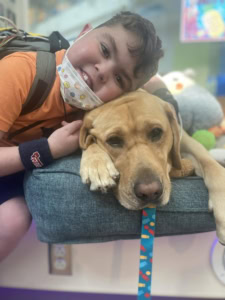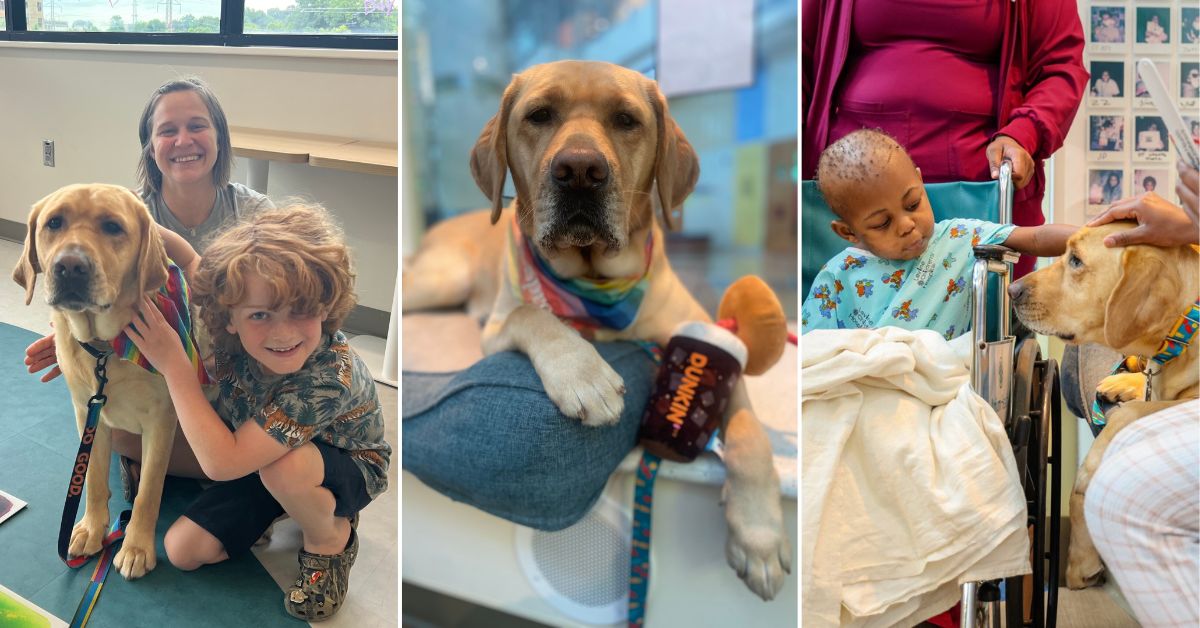When a child is faced with an injury or illness at Atrium Health Levine Children’s Hospital, one special teammate is prepared to lend a helping paw. Sprout, a 4-year-old Labrador retriever, is a full-time facility dog specifically trained to work in health care settings. In his first year at Levine Children’s, he has logged over 3,350 encounters with patient families and staff. His work is made possible by a $150,000 grant from Dunkin’ Joy in Childhood Foundation’s Dogs for Joy™ program, which aims to increase the number of dogs that work full-time in children’s hospitals.
As a facility dog, Sprout serves as a core member of the treatment team, working in tandem with physicians, nurses, and Child Life specialists to help patients achieve their clinical goals. On the inpatient rehabilitation unit, this often means motivating patients to complete their physical therapy exercises. In the Torrey Hemby Center for Cancer & Blood Disorders, he leads programs like “Arts & Barks” to bring comfort to children going through treatment. Sprout is the first dog to work directly with cancer patients at Levine Children’s – a milestone made possible by the Dogs for Joy™ grant, which helped purchase proper sanitization materials to keep kids in the clinic safe.
The power of the human-animal bond

In late summer 2023, as other kids headed back to school, 7-year-old Theo Tyler was admitted to Levine Children’s Hospital while he awaited a heart transplant. He quickly developed a friendship with Sprout and made daily visits down to Seacrest Studios to be with him. After 122 days in the hospital, Theo received news that a donor heart was ready, and Sprout stayed with him for his surgery preparation. When it was time to go to the operating room, Theo was encouraged by holding tight to a paw mold of his best friend. Thankfully, Theo’s heart transplant surgery was successful, and he finally returned home. To this day, when he comes to the hospital for follow-up care, he never misses the opportunity to visit Sprout.
“Dogs can reach people in a way that we can’t,” said Sprout’s owner, Rebecca Wagner, MS, CCLS, business operations manager of Seacrest Studios, Arts for Life, and Music Therapy at Levine Children’s. “There is something so warm and inviting about a dog that has transformed how we reach patients. The moment we walk into a room with Sprout there is an instant lightness and intrigue from patients and families.”
Rachel Ellis, assistant vice president of corporate & foundation relations/grants at Atrium Health Foundation, underscored the importance of Dunkin’ Joy in Childhood Foundation’s partnership. “This grant has allowed patients to find their safe space with Sprout,” she said. “Before surgeries, kids will ask to spend time with him. Before big procedures, the kids will request to see Sprout first. He has fostered a kind and inclusive space for so many, which is all due to the generosity of Dunkin’.”
Sprout’s impact can be felt daily across Levine Children’s, and with charitable support from individuals and organizations like Dunkin’ Joy in Childhood Foundation, we will continue to grow this important program to impact even more children and families in our community. Click here to learn more about Dunkin’ Joy in Childhood Foundation.
About Dunkin’ Joy in Childhood’s Dogs for Joy™ program
The Dogs for Joy™ program has funded over 40 in-resident facility dogs at hospitals across the country. A facility dog is professionally trained to work in a healthcare setting. Unlike volunteer dogs that visit a hospital or medical center for a short time, facility dogs are at the hospital every day with their handlers. In most cases they are used exclusively for clinical work.
The dogs can physically interact with patients to provide comfort and love. These dogs are trained to help with tasks like teaching kids how to take medication, keeping a child calm during medical intervention, and providing incentives for kids to get out of bed for a walk. These dogs serve as a source of happiness and provide a sense of normalcy for patients.
Research shows that animal-assisted therapy can lower stress and anxiety levels, affect blood pressure, increase patient mobility, and provide an alternative focus from pain. They help patients lower their stress and anxiety and encourage them to complete their health care goals.

